BANKRUPTCY OF THE COMPANY AS A CONSEQUENCE OF MANIPULATIVE FINANCIAL REPORTING
Abstract
Business of companies in terms of financial instability and market uncertainty can lead to a significant increase in bankruptcy risk and the risk of financial statements manipulation. A creative accounting practice has led many companies in the world to bankruptcy. Creative accounting means all accounting practices that deliberately deviate from the standardized ones, in order for the external users to be presented with the desired, not the actual yield and the financial strength of the company.
Numerous corporate accounting scandals were the cause for initiatives to strengthen the protection of shareholders and all other interested users of financial statements (investors, creditors, tax authorities, etc.) from manipulative financial reporting in countries around the world. In such circumstances, responsibility for the detection and prevention of possible manipulation with the data presented in the financial statements have: external and forensic audit, internal control and management of the company, accountants - forensics and state.
References
Budimir, N. (2013). Forenzičko računovodstvo. Anali poslovne ekonomije, 1(8), 1-16.
Dembinski, H.P., Lager, C., Cornford, A., & Bonvin, J.M. (2006). Enron and World Finance, a Case Study in Ethics. USA: Palgrave Macmillan.
Dmitrović-Šaponja, L.J., & Milutinović, S. (2009). Etička odgovornost i posledice neetičkog ponašanja u procesu finansijskog izveštavanja. Anali Ekonomskog fakulteta u Subotici, 22, 177-187.
Gherai, S.D., & Balaciu, E.D. (2011). From Creative Accounting Practices and Enron Phenomenon to the Current Financial Crisis. Annales Universitatis Apulensis Series Oeconomica, 1(13), 34-41.
Kaparavlović, N. (2011). Uticaj kreativnog računovodstva na kvalitet finansijskog izveštavanja. Ekonomski horizonti, 13(1), 155-168.
Li, Y. (2010). The Case Analysis of the Scandal of Enron. International Journal of Business and Management, 5(10), 37-41.
Malinić, D. (2009). Savremeni izazovi integralnog istraživanja kvaliteta finansijskih izveštaja. Ekonomika preduzeća, 57(3-4), 138-155.
Moghadam, A.G., Zadeh, F.N., & Fard, M.M.G. (2009). Review of the Prediction Power of Altman and Ohlson Models in Predicting Bankruptcy of Listed Companies in Tehran Stock Exchange – Iran. U: International Conference on Intellectual Capital Management. 1-14. Preuzeto sa http://www.mbaforum.ir/download/mba/m/7th/236.pdf
Novalija, S. (2011). Forenzično računovodstvo i uticaj kreativnog računovodstva na finansijske izvještaje. U: II međunarodna konferencija - Ekonomija integracija. Tuzla: Ekonomski fakultet u Tuzli.567-585.
Petković, A. (2010). Forenzička revizija - kriminalne radnje u finansijskim izveštajima. Bečej: Proleter AD Bečej.
Petković, A. (2011). Šta je zaista forenzičko računovodstvo. U: VI Kongres računovođa i revizora Crne Gore - Finansijsko izvještavanje u funkciji unapređenja poslovnog ambijenta u Crnoj Gori. Bečići. ISRCG.93-107.
Shilit, M.H., & Perler, J. (2010). Financial Shenanigans: How to Detect Accounting Gimmics & Fraud in Financial Reports. USA: Mc Graw-Hill.
Škarić-Jovanović, K. (2006). Kreativno računovodstvo - motivi, instrumenti i posledice. U: 11. Kongres računovođa i revizora Republike Srpske, Banja Vrućica. SRRRS.1-20.
Škarić-Jovanović, K. (2011). Finansijsko izveštavanje preduzeća u bankrotstvu. Acta economica, 9(14), 9-36.
Spirović-Jovanović, L. (2004). Trgovinsko pravo. Beograd: Međunarodni naučni forum 'Dunav-reka saradnje'.
Zakon o stečaju. Službeni glasnik RS, br. 104 (2009) i 99 (2011) - dr. zakon i 71 (2012) - odluka US.
Zakon o računovodstvu i reviziji. Službeni glasnik RS, br. 46/06 i br. 111/09.
Zakon o reviziji. Sl. glasnik RS, (2013). 62.
- Authors retain copyright and grant the journal right of first publication with the work simultaneously licensed under a Creative Commons Attribution License that allows others to share the work with an acknowledgement of the work's authorship and initial publication in this journal.
- Authors are able to enter into separate, additional contractual arrangements for the non-exclusive distribution of the journal's published version of the work (e.g., post it to an institutional repository or publish it in a book), with an acknowledgement of its initial publication in this journal.
- Authors are permitted and encouraged to post their work online (e.g., in institutional repositories or on their website) prior to and during the submission process, as it can lead to productive exchanges, as well as earlier and greater citation of published work (See The Effect of Open Access).

